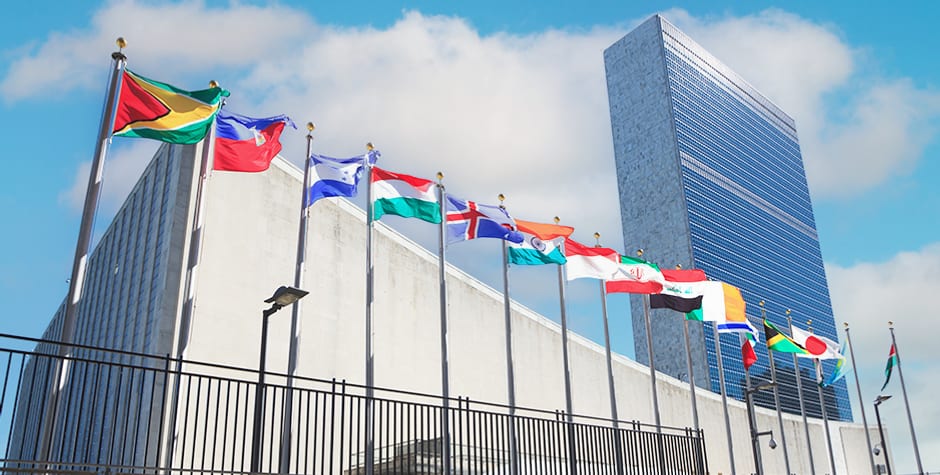ACLJ’S Week at the UN Advocating for Persecuted Christians in Pakistan and India
Listen tothis article
My colleagues from the ACLJ, along with our European affiliate, the European Centre for Law and Justice (ECLJ), and I recently spent a week at the United Nations Human Rights Council in Geneva, advocating for Christians being persecuted in India, Pakistan, Nicaragua, and Azerbaijan.
The main highlight of our trip was an event we hosted at the U.N. regarding the persecution of Christians in India under its anti-conversion laws. For decades, Christians have been arrested and prosecuted by the Indian government and brutally attacked, assaulted, and even killed by Hindu nationalist mobs over false allegations of “forced” conversion of Hindus to Christianity.
At the event in Geneva, my colleagues and I highlighted the serious flaws in India’s anti-conversion laws. Ironically titled, “Freedom of Religion Acts,” these laws have been enacted by several states in India and are designed to prohibit Christians and Muslims from sharing their faith with Hindus.
They prohibit the conversion of Hindus by force, fraud, inducement, or allurement. These terms are broadly defined. For instance, the threat of divine displeasure constitutes force, and giving a poor person food constitutes inducement.
Hundreds of Christians are either arrested by the police or violently attacked by Hindu mobs over false allegations of forced conversions. Just last year, over 600 cases were reported.
Sign Our Petition To Defend Persecuted Christians in India.
In addition to the event centered on India, we met with several U.N. officials and discussed the cases of some of our clients in Pakistan, especially those on death row in cases of blasphemy. Our team met with the offices of U.N. Special Procedures on the freedom of religion or belief, judicial independence, and extrajudicial killings, among others.
We also met with staff from the Permanent Mission of Pakistan, who showed a real interest in the cases of false accusations of blasphemy and assured us that they would communicate our concerns and information about the cases with the proper authorities in Pakistan.
The three major cases that we brought to their attention are those of Amoon Ayub, Shahzad Masih, and Ahsan Masih. All three Christians were sentenced to death after false allegations of blasphemy.
Add your name to this petition to save Ahsan Masih from hanging.
Amoon Ayub and his brother, Qaiser Ayub, were accused of creating a blasphemous website. Even though the police did not have any evidence that the Ayub brothers created the website, the trial court sentenced them to death, the High Court upheld their conviction, and the Supreme Court is yet to hear their appeal. The Ayub brothers have already spent 10 years in prison.
Shahzad Masih was only 16 years old when he was falsely accused of committing blasphemy. His Muslim co-worker began a conversation about a religious topic with Shahzad. During the conversation, Shahzad informed his co-worker that a friend of his father says swear words whenever he hears anyone’s name that has Muhammad in it. While this does not constitute an offense even under Pakistan’s blasphemy laws, the trial court sentenced him to death. Shahzad has spent almost eight years in prison.
Ahsan Masih was accused of posting a picture of a blasphemous page on TikTok. The page was alleged evidence in another blasphemy case. About 300 km away from Ahsan’s hometown and unrelated to Ahsan, two men were accused of desecrating a page of the Quran. The two men were arrested, and the desecrated page was handed over to the police. Someone posted a picture of the page on the internet. Thousands of people received, resent, or reposted it. Out of those thousands, only Ahsan was arrested for reposting. However, the forensic report of his phone and TikTok account failed to establish that Ahsan had the picture or reposted it. Yet, the trial court sentenced him to death. Ahsan has spent almost two years in prison.
Christians like Amoon, Shahzad, and Ahsan are unable to speak for themselves. They are locked away in some of the harshest conditions imaginable. Their voices can only be heard at an international level through the support of their Christian brothers and sisters around the world.
We are hopeful that our continued efforts on both domestic and international levels will produce fruit in both India and Pakistan. We pray that the anti-conversion laws are overturned in India and these three Pakistani Christians will be exonerated and released from prison to be with their families.
